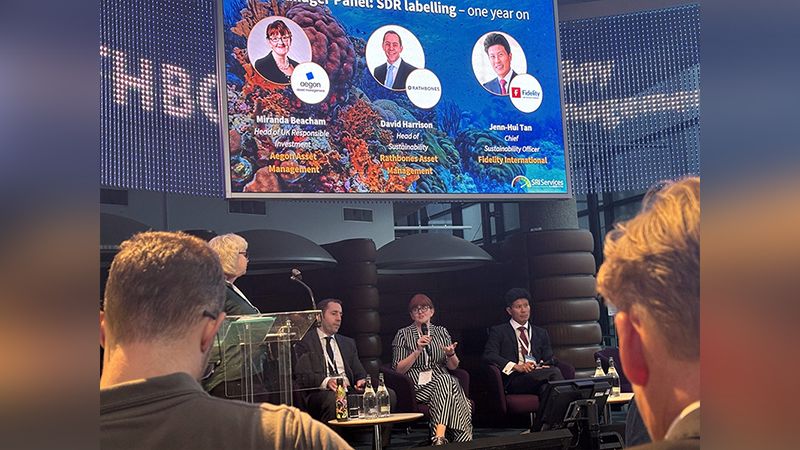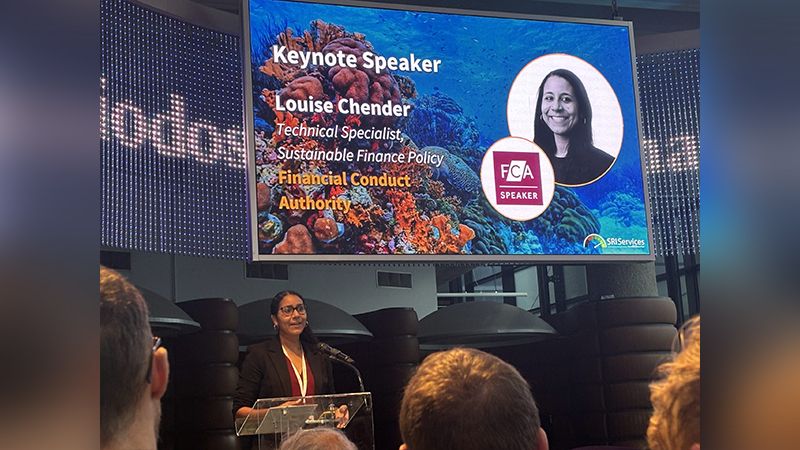
SDR: The ‘missed opportunity’ and yet a chance get it right
The UK’s Sustainability Disclosure Requirements (SDR) has started to reshape the sustainable investment landscape, forcing a higher standard of fund disclosure. But the uptake has been limited and there have been some “missed opportunities” in terms of labelling and delays, according to speakers at the SRI Services and Partners event for Good Money Week.
Responsible investment experts speaking at the event agreed SDR, one year on from its launch, is a “good piece of regulation” and added the lull in demand for sustainable investment products seen recently is an opportunity to bed down and get things right before appetite inevitably returns. However, there were also calls for the Financial Conduct Authority (FCA) to address the 350 funds identified as ‘unlabelled with sustainability characteristics’ and provide clarity on the extension to portfolio management and overseas funds – with this being cited as a potential constraint on demand among UK wealth managers.
‘Missed opportunity’
During the event’s opening remarks, Julia Dreblow, founder of SRI Services and Fund Ecomarket database, reminded attendees why SDR was needed in the first place: “What we saw around the 2021–22 period was this massive bubble where people were launching all sorts of funds that were nothing much to do with sustainability,” she said. “They had a bit of ESG integration, and they were claiming to solve everything. SDR was 100% needed to address that.”
Today, there are around 150 funds that have adopted one of the four SDR fund labels – Focus, Impact, Improvers and Mixed Goals – while 350 funds remain ‘unlabelled with sustainability characteristics’.
“That is a missed opportunity,” said Miranda Beecham, head of UK responsible investment at Aegon Asset Management.
“Like Julia, I absolutely believe this is a good piece of regulation. I really do think this was needed at the time. We needed to create clarity. We needed to create choice. We needed to create trust.
“But there’s still a bit of a missed opportunity. Those funds sitting in that bucket of 350 are a real suite of different types of funds… many could have fitted into one of the labels, but because it’s been quite difficult and very costly to get a label, and there’s not the demand from clients at the moment, it’s not worth it.”

From last year’s conference: FCA’s Sadan: There is an enormous pipeline of funds applying for SDR labels
Echoing her experience with the applying for labels, which she shared at last year’s conference, Beecham said the process was “long, painful with a lot of back and forth”. She also reiterated the need for ethical funds to have a place in SDR labelling.
“This is something that has been going for decades – Aegon has had ethical funds since 1999.
“I do think something needs to be done to sort this out – they don’t have a space, they don’t have a category. I would love for that to be fixed.
“Ethical funds aren’t just ‘buy and hold and do nothing’. Engagement is a key part of our approach. But many investors start with what they don’t want in their portfolios.”
“There’s a world of difference between avoiding the bad and actively leaning in to solve problems. Both have a place – but they’re different approaches.”
However, she added she still had “high hopes” for SDR while fellow panellists David Harrison, head of sustainability and lead fund manager of the Rathbone Greenbank Global Sustainability fund, and Jenn-Hui Tan, chief sustainability officer at Fidelity International, agreed it had improved the fund landscape so far.
Harrison said: “We went through 14 rounds of questioning with the FCA. It was challenging — especially articulating our approach for multi-thematic strategies — but the benefits outweighed the challenges. It sharpened how we express our standards and address greenwashing.”
Tan added: “The FCA set a high bar. Their focus on disclosure and rationales for the standards we use will lead to better transparency for retail customers. Over time, this will become easier and quicker.”
FCA ‘raising the bar’ on greenwashing
Louisa Chender, sustainable finance policy technical specialist at the FCA, also spoke at the event explaining the regulator’s perspective on the regime’s implementation so far.
“Climate and sustainability risks and opportunities are financial risks and opportunities. That’s the starting point for everything we do,” she told guests. “We introduced the regime to help consumers navigate a complex market, give them better information, and reduce greenwashing. Ultimately, it’s about rebuilding trust in this space.”
Chender also stressed that labelling was never designed to apply to all products. “Labels are doing something very specific,” she explained. “They’re for funds that have a positive sustainability objective and are accountable to it. But the non-labelled side of the market still matters. Those funds will still need to disclose their sustainability characteristics so that consumers can make an informed choice.”
She also highlighted the further guidance the FCA published for firms applying for labels as an example of their continued engagement with the industry.

Delay is ‘pause not a stop’
Earlier this year, the FCA announced a delay to the rollout of SDR to portfolio management – something which Rathbone’s Harrison described as the “missing piece” for the fund labelling regime to bed in.
“There’s so much interest from wealth managers. Once portfolio management is brought in, it will help from the demand side a lot. At the moment, it feels like a missing piece.”
It was indicated that until wealth managers can formally apply for SDR labels at the portfolio level, or be given a clear regulatory pathway to use them in client communications, uptake will remain constrained.
“We’ve heard your feedback loud and clear,” responded the FCA’s Chender. “It’s a pause, not a stop. We want to make sure the fund regime is embedded first before we extend it to portfolio management and overseas funds.”
No fixed date was given for the extension to both pillars, but Chender emphasised the ongoing engagement with the industry on this topic.
Demand not going away
The anti-ESG rhetoric in the US is still having an effect on investor demand and this is being felt in the UK too – but it was noted that European corporates are still pushing ahead with things such as transition plans and improving sustainability disclosures voluntarily.
Dreblow also highlighted public interest in sustainability remains high – pointing to data from Google Analytics and Trends – despite cooling headlines and softer flows. “People are still searching for information on sustainability,” she said “The bubble has come down — but interest hasn’t disappeared.
“A lot of people are still concerned and the planet is clearly warming a lot – the numbers are terrifying. No amount of talking nonsense is going to address that. It’s actual action that will address that.”
Fidelity’s Tan added: “This is a challenging time for sustainable funds from a performance perspective. But cycles turn – and we’re positioning for that . When the demand comes back, we want to be ready with products that have credibility and trust behind them.”
Rathbone’s Harrison pointed to the slower uptake of SDR labels and the pause on portfolio management rollout – while a potential constraint on demand – as an opportunity to “get it right”.
“We’ve got a bit of breathing space now, which I actually think is a good thing. It gives us time to get it right, to make sure we’re clear about what good looks like and where the demand is going to come from. When it does come back, we’ll be ready.”
Chender also shared this sentiment adding building trust takes time: “Seven out of 10 adults say they want their money to do some good as well as make returns. Consumers want to invest sustainably, but they need an ecosystem they can trust. SDR is a key part of building that confidence.
“This isn’t going to flip overnight. But by setting clear standards and raising the bar now, we’re building the foundation for the future.”